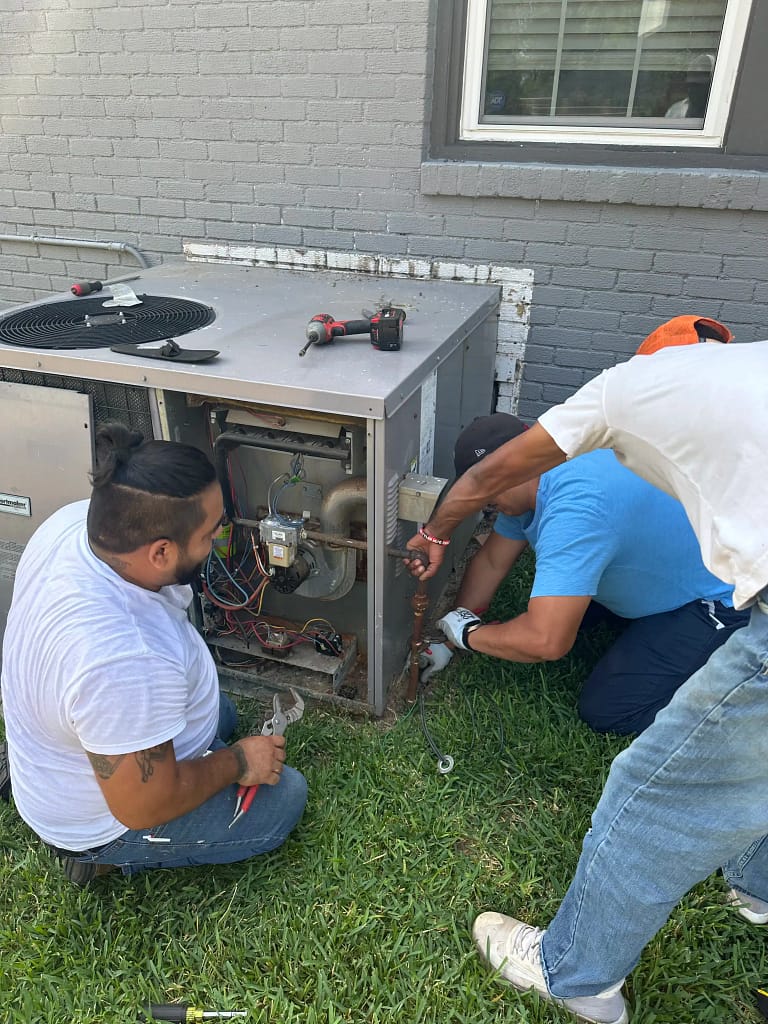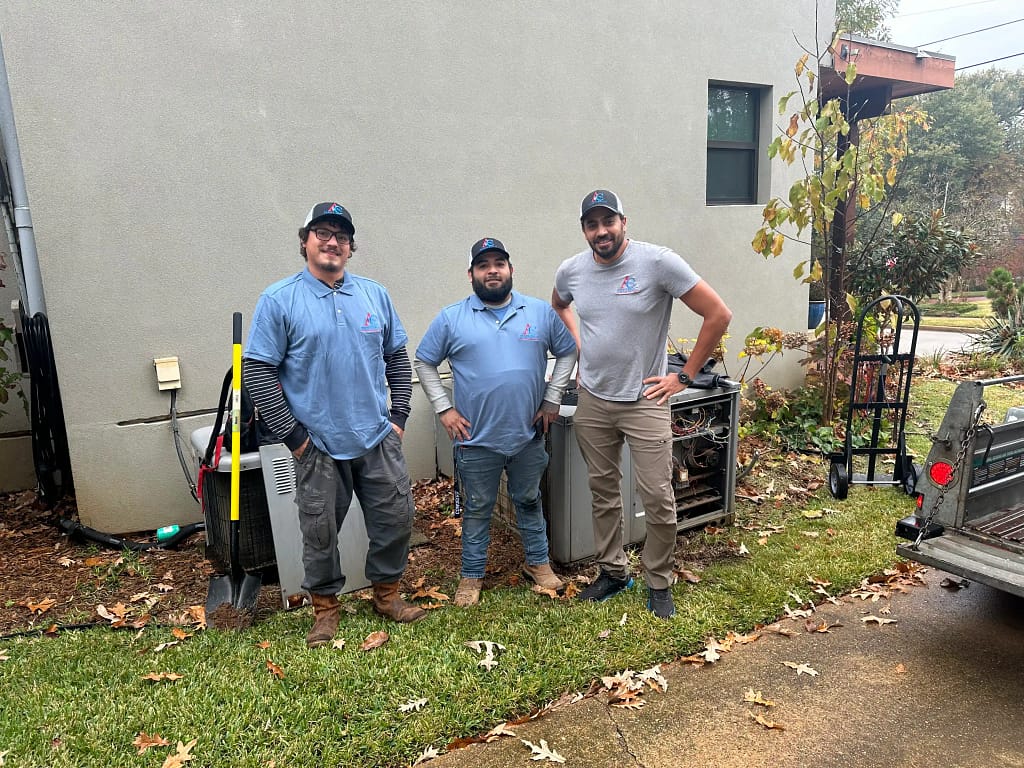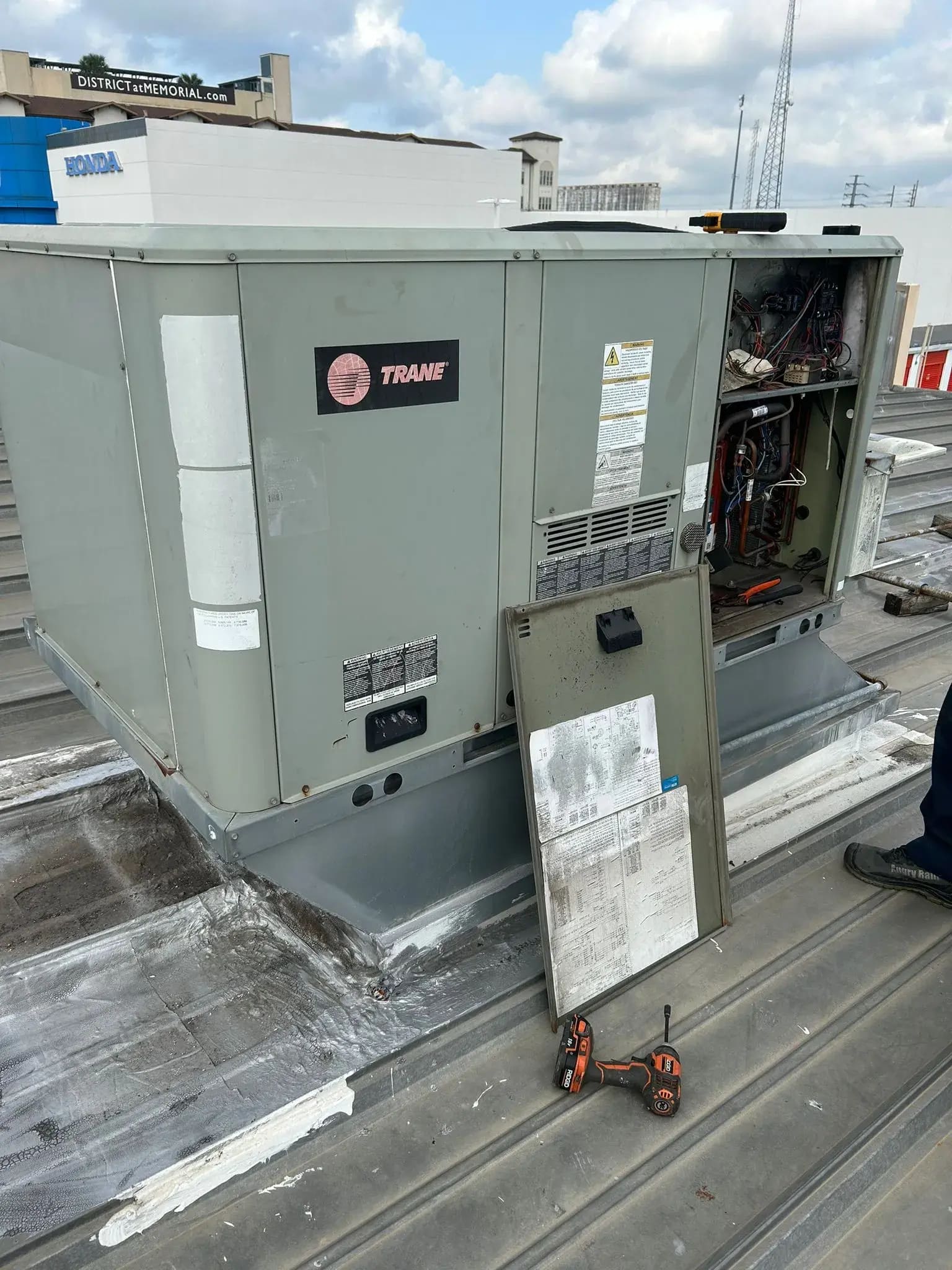HVAC replacement represents one of the most significant home improvements you’ll make in terms of cost for HVAC replacement. However, unlike purely aesthetic upgrades, a new HVAC system directly impacts your daily comfort, energy bills, and home value. This comprehensive guide will walk you through everything you need to know about the cost of HVAC replacement, helping you navigate this important decision with confidence.
Average Cost for HVAC Replacement
The landscape of HVAC replacement costs has undergone significant evolution in recent years, driven by supply chain adjustments, technological advancements, and shifting efficiency standards. In 2025, homeowners can expect to invest between $11,590 to $14,100 for a complete HVAC system replacement, with most installations falling in the $8,000 to $12,000 range.
For an accurate estimate on the cost of HVAC replacement, contact 24SevenAC!
HVAC Replacement Cost by Unit Type
The type of HVAC system you choose plays a significant role in the overall replacement cost. Each system has its own complexities and installation requirements.
| Type of unit | Cost |
| Central Air Conditioners | $2,500 to $5,500 |
| Split Air Conditioning Systems | $2,000 to $3,000 |
| Heat Pumps (Air-Source and Geothermal) | $4,500 to $12,000 |
| Furnaces | $1,600 to $9,700 |
- Central Air Conditioners:
These are a popular choice for whole-home cooling. The units themselves for a central air system can range from $2,500 to $5,500, with total installed costs often aligning with the general cost for HVAC replacement averages mentioned above. If your home lacks existing ductwork, the cost for central air replacement will increase significantly due to the need for new duct installation.
- Split Air Conditioning Systems:
Similar to the average cost for central air replacement, but with an indoor and outdoor unit, these can cost anywhere from $2,000 to $3,000 for the unit alone. They can be ducted or ductless, with ductless mini-splits gaining popularity for their energy efficiency in smaller homes or for zoned comfort.
- Heat Pumps (Air-Source and Geothermal):
Heat pumps offer both heating and cooling, making them a versatile option. Air-source heat pumps typically range from $4,500 to $12,000 installed. Geothermal systems, which tap into the earth’s stable temperatures, are considerably more expensive upfront due to ground loop installation, often starting at $15,000 for the cost of HVAC replacement and going much higher, but offer significant long-term energy savings.
- Furnaces:
If you’re only replacing a furnace (and not the entire HVAC system), costs can range from $1,600 to $9,700, including installation and old unit removal.
- Packaged Units:
These self-contained units are typically found on rooftops or outside commercial buildings, but some residences utilize them. They can be more expensive to install due to their size and weight.
Uncovering “Hidden” Costs in HVAC Replacement
While a detailed quote aims for transparency, some potential costs might not be immediately obvious or can emerge during the installation process. Being aware of these can help you avoid unwelcome surprises:
- Ductwork Issues:
Old or improperly sized ductwork can significantly diminish the efficiency of a new HVAC system. Leaky, corroded, or undersized ducts can lead to energy loss and uneven heating or cooling. If your existing ductwork needs extensive repair, sealing, or complete replacement, this will add to your overall cost for HVAC replacement. Duct replacement alone can range from $1,500 to $16,000 depending on the extent and complexity.
- Electrical Upgrades:
Modern, high-efficiency HVAC systems often have different electrical requirements than older units. You might need a dedicated circuit, an upgraded electrical panel, or new wiring to accommodate the new system. These electrical upgrades can add several hundred to over a thousand dollars to the bill.
- Structural Modifications:
In some cases, particularly with system type changes or significant sizing differences, minor structural modifications to your home might be necessary. This could involve adjusting framing to fit a new air handler or creating a new access point.
- Unexpected Repairs:
While a thorough HVAC inspection cost is usually part of the initial assessment, unforeseen issues can sometimes arise once the old system is removed or during the installation of the new one. This could involve finding hidden mold, water damage, or previously undetected issues with the home’s infrastructure.
- Maintenance Plans:
While not a “hidden cost for HVAC replacement” in the traditional sense, neglecting to factor in ongoing HVAC maintenance cost can be an expensive oversight. Many contractors offer service agreements that include regular tune-ups and priority service. While an upfront expense (often $100-$350 annually), these plans can prolong your system’s life, maintain efficiency, and prevent costly breakdowns, effectively reducing your HVAC system repair cost in the long run.
Breaking Down the Bill: What Your HVAC Quote Should Include
When you receive a quote for HVAC replacement, it shouldn’t just be a single, intimidating number. A reputable HVAC professional will provide a detailed cost for HVAC replacement, offering transparency and helping you understand where your money is going. Here’s what a comprehensive quote should encompass:
Equipment Costs:
This is the heart of the matter: the actual price of the new HVAC unit(s) themselves. This will vary greatly depending on the brand, model, size (BTUs or tonnage), and efficiency ratings (SEER, AFUE, HSPF). Higher efficiency ratings typically mean a higher upfront cost but promise significant long-term savings on energy bills.
Installation Labor:
This covers the hours and expertise of the technicians installing your new system. Labor can be a substantial portion of the total cost for HVAC replacement, often accounting for 30% or more. Factors like the complexity of the installation, accessibility of the site (e.g., tight attics, multi-story homes), and the need for specialized equipment can influence labor costs.
Ancillary Materials:
Beyond the main unit, many other materials are required for a proper installation. This includes new refrigerant lines, electrical wiring, ductwork modifications or replacements (if needed), mounting pads, fittings, insulation, and condensate drains. These smaller components can add up.
Permits and Inspections:
Most municipalities require permits for HVAC replacement projects to ensure the work meets local building codes and safety standards. The cost of these permits varies by location and is typically included in your cost for HVAC replacement quote. Furthermore, a post-installation inspection by a city or county inspector is often mandated, and your contractor should facilitate this.
Old System Removal and Disposal:
Properly disposing of your old HVAC unit and its components, especially refrigerant, requires specialized handling. Your quote should clearly state whether this service is included and any associated fees.
Optional Upgrades:
Many homeowners opt for upgrades that enhance comfort, efficiency, or control. These might include smart thermostats, zoning systems (allowing different temperatures in different areas of your home), air purifiers, humidifiers, or dehumidifiers. Discussing these options with your contractor allows you to tailor the system to your specific needs and the cost for HVAC replacement budget.
Warranty Information:
A clear understanding of the warranty on both the equipment and the installation labor is crucial. Most manufacturers offer a warranty on parts, and a good contractor will provide a warranty on their workmanship. This protects your investment in the long run.
Key Factors Influencing Your HVAC Replacement Cost
Beyond the basic unit type and potential hidden surprises, several key factors significantly influence the final price tag:
- System Size and Capacity (Tonnage)
- Brand and Model
- Ductwork Condition and Modifications
- Installation Complexity
- Geographic Location
The final cost for HVAC replacement is shaped by several critical factors: the correct size and capacity for your home, its energy efficiency ratings (which balance upfront cost with long-term savings), the chosen brand and model, the need for any ductwork repairs or modifications, the complexity of the installation, and your specific geographic location, which influences labor and equipment costs.
Smart Strategies to Save on Your HVAC Replacement
While HVAC replacement is a significant investment, there are ways to mitigate the financial impact:
- Get Multiple Quotes.
- Consider off-season installation.
- Explore Rebates and Incentives.
- Don’t Get a Larger System Than You Need.
- Maintain Your New System.
- Ask About Financing Options.
When to Repair vs. Replace Your HVAC System: The “5,000 Rule” and Beyond
Deciding whether to repair your ailing HVAC system or bite the bullet and replace it is a common dilemma. Here are some key considerations to learn before investing in the cost for HVAC replacement:
- The Age of Your System:
Generally, air conditioners and heat pumps have a lifespan of 10-15 years, while furnaces can last 15-20 years. If your system is approaching or has exceeded these age benchmarks, replacement becomes a more sensible option, even for seemingly minor repairs. Older units are inherently less efficient and use outdated refrigerants (like R-22, which is being phased out, making repairs more expensive and parts harder to find).
- Frequent and Costly Repairs:
If you’re constantly calling for service and racking up significant HVAC System Repair Cost, it’s a clear sign that your system is on its last days. The money spent on repeated repairs could be better invested in a new, reliable unit, in the cost for HVAC replacement.
- Declining Efficiency and Rising Energy Bills:
A noticeable increase in your heating and cooling bills, despite consistent usage, indicates a decline in your system’s efficiency. Older systems simply can’t compete with the energy savings offered by modern, high-SEER units.
- The “5,000 Rule” Explained:
This is a handy rule of thumb widely used in the HVAC industry to help homeowners decide. Multiply the age of your system by the estimated cost of the repair. If the total exceeds $5,000, it’s generally more financially prudent to replace the system rather than repair it. For example, a 12-year-old system needing a $500 repair would result in $6,000 (12 x $500), suggesting the cost for HVAC replacement is the better choice. This rule helps put the current repair cost into perspective against the remaining lifespan and potential future repairs of an aging unit.

The Long-Term Value of a New HVAC System
While the initial cost for HVAC replacement can feel daunting, it’s essential to consider the long-term value it brings. A new, energy-efficient HVAC system offers:
- Significant Energy Savings: Modern systems are vastly more efficient than those even a decade old, translating to substantial savings on your monthly utility bills.
- Improved Comfort and Indoor Air Quality: New systems provide more consistent temperatures, better humidity control, and improved air filtration, leading to a healthier and more comfortable indoor environment. Understanding your HVAC controls explained with a new system, can unlock even greater comfort and efficiency.
- Increased Home Value: An updated HVAC system is an attractive feature for potential buyers, potentially increasing your home’s resale value and appeal.
- Reduced Carbon Footprint: Higher efficiency means less energy consumption, which is better for the environment.
- Peace of Mind: A new system comes with warranties and the reassurance of reliable operation, minimizing the stress and inconvenience of unexpected breakdowns.
Why is HVAC replacement so expensive?
It’s natural to wonder why the cost for HVAC replacement seems so high. Several factors contribute to this, including complex technology, skilled labor, material costs, and regulatory compliance.
How Often Should You Replace Your HVAC?
As a general guideline, most HVAC professionals recommend considering replacement for air conditioners and heat pumps around the 10-15 year mark and furnaces around 15-20 years. However, this isn’t a hard and fast rule. The actual frequency depends on system usage, maintenance history, installation quality, and watching out for early warning signs.
24SevenAC The Right HVAC Professional Near You
When it comes to something as critical as your home’s comfort system, choosing the right HVAC professional is paramount. In Houston, TX, and the surrounding areas, 24SevenAC stands out as a trusted and reliable partner for all your HVAC needs, including comprehensive replacements.
A reputable company like 24SevenAC will provide detailed, transparent cost for HVAC replacement quotes, employ experienced and certified technicians, and stand behind their work with solid warranties. We understand the nuances of HVAC systems and can guide you through the entire replacement process, from accurate sizing and efficiency recommendations to exploring financing options and ensuring proper installation. Don’t hesitate to reach out for an HVAC inspection cost or a detailed quote for your replacement needs.

Conclusion
The cost for HVAC replacement is a significant consideration for any homeowner. However, by understanding the various factors that influence pricing, being aware of potential hidden costs, and implementing smart strategies, you can approach this investment with confidence. A new HVAC system isn’t just an expense; it’s an investment in your home’s comfort, energy efficiency, and long-term value. By choosing the right system and a qualified professional, like 24SevenAC in Houston, TX, you’re ensuring years of reliable, efficient comfort for your household.




